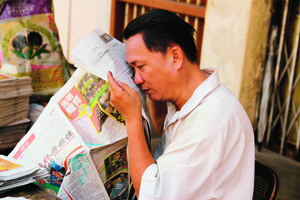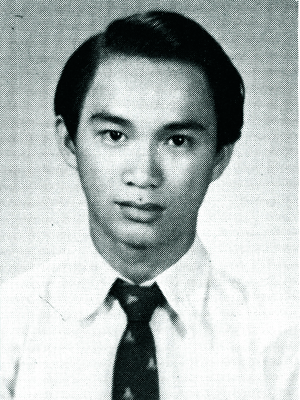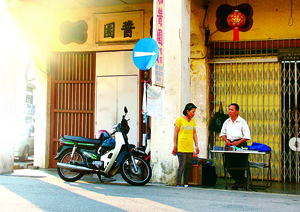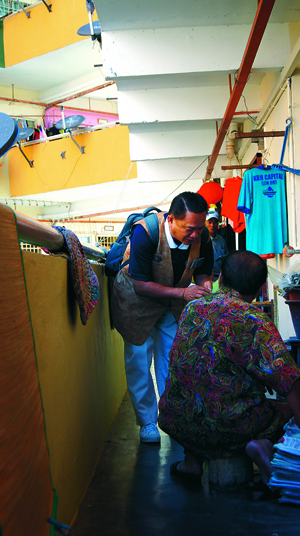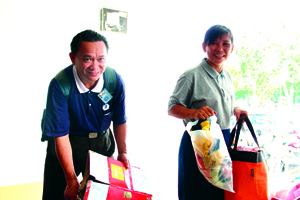

| Seeing With the Heart | ||||||||
| Text and Photos by Du Hui-xi Translated by Tang Yau-yang | ||||||||
The sudden loss of most of his eyesight at a young age made his world gloomy. Little did he know that donating unsold newspapers would lead to an unexpected turn in his life. Now he does his best to help people help others.
Lin Rong Quan (林榮泉) lives in a 17-story apartment building in Penang, Malaysia. The building was constructed in the 1970s, and Lin has lived there for 44 of his 50 years. Every day, he combs his hair to resemble John Travolta, his idol from the old days. He wants to make sure that he looks decent before he leaves the apartment. He’s been like that for decades. He looks and walks like any average man. Every afternoon at four, carrying his heavy tote bag and an umbrella, whose main purpose is to fend off aggressive dogs, he walks slowly and carefully to the newsstand where he sells newspapers. To those who do not know him, he appears to be an ordinary newspaper vendor. However, the ease with which he does these everyday actions has actually come to him after years of falls and frustration. His younger sister, Lin Qing Jiao (林清嬌), knows that well. She recounted a couple of the incidents that he’s had over the years, her heart full of sympathy for his poor eyesight: “One day on his way to his newsstand, he bumped into a fire hydrant. It took ten stitches to close the wound. Another time he kicked a cat and was almost bitten.” Lin himself remembered another time. “One day I wanted to step over a ditch, but I fell into it instead. I felt that Heaven was making a fool of me. Instead of looking after me after taking away my eyesight, it made me fall or bump into things and get injured or bruised. Honestly, I was really depressed at the time.” Shattered dreams Lin was raised in an impoverished family. He started selling newspapers to supplement the family income while attending junior high school. Despite his young age, he knew that working hard was the only way to escape poverty. His ambition as a young person was to go into business and make it big.
He started taking steps toward that goal after graduating from high school. He was willing to learn or do anything that he believed could help him succeed and make money in the future. He was an air conditioning apprentice, became involved in import and export trading, and even tried his hand at direct sales. He envisioned becoming a homeowner at 25 and getting married at 30. He believed a bright future awaited him as long as he worked hard. Unfortunately, his grand plans were derailed when he was stricken with a stubborn eye disorder at the age of 23. The doctor suspected that Lin suffered from optic neuritis, an inflammation of the optic nerve, but he could offer no effective treatment for this condition. Lin tried everything he could—from medical help to divine guidance—but no matter what he did, a cure proved elusive. The only thing his attempts brought him was a depleted bank account. In the end, he became completely blind in his left eye. His right eye was a little better, but not much: Its visual acuity was less than 20/200, or just 20 percent of normal visual efficiency. “The suffering caused by being sightless is not just temporary,” Lin said, recalling his state of mind in the early days of his near total blindness. “It lasts a lifetime. You feel that there’s no hope for you. When I was learning how to use a white cane at a school for the blind, tears would roll down my cheeks as soon as I picked the cane up. I just couldn’t come to terms with what had happened to me.” He wanted to be able to see so badly that he even dreamed about it. He’d dream of a blurry blackboard with words that he just could not make out. Sometimes he found himself crying after waking up from such dreams. He had a steady girlfriend at that time, but he decided to terminate the relationship. He believed that he should set her free if he could not bring her happiness. His pride made him leave her and keep his misery to himself. Clinging to a faint hope of finding a cure for his eyes, he began selling newspapers again. He had done this as a child, but it was something he had never dreamed of doing as a full-time occupation. Sadly, a cure for his eye disease never came, and time marched on relentlessly as he passed one day after another selling newspapers.
A glimmer of hope In 1998, Lin learned from a volunteer that Tzu Chi Malaysia had been channeling all proceeds from its recycling efforts, which it had started the year before, to help impoverished people receive free services at the foundation’s dialysis center in Penang. Because of his own eye disorder, he knew only too well how tough it was to be sick. In response, he decided to regularly donate the leftover newspapers at his newsstand to Tzu Chi. This decision unexpectedly led him to “see” light again in his life. In addition to donating leftover newspapers to the foundation, he started knocking on doors to solicit donations of recyclables. He asked for such things as old newspapers and used clothing. Such interactions with strangers helped him get to know more people and provided him with opportunities to introduce Tzu Chi and raise money for the foundation.
He has been doing this for 16 years. One of the tools that he uses to spread the word about the foundation is the Tzu Chi Monthly magazine. “Once I gave a copy of the Monthly to a friend. A few days later he told me he wanted to become a donating member [one who makes monthly donations to Tzu Chi],” Lin recalled. “A month after that, he told me he had recruited seven other donating members.” Lin says that he can’t overstate how important this Tzu Chi periodical is to him. Lin doesn’t give up easily when he encounters people who say no. For example, one time he met a man who said, “I’m old, and I myself need help. How can I help others?” Lin shared his own experience with the man to illustrate that even people with modest means can give just as well. His story proved that making donations is not the exclusive province of the rich, nor is the amount of money donated all that important. He urges people not to delay in helping others. “Doing good deeds should not be put off; instead it should be sped up,” he said to a woman. “The new dialysis center will be completed in two months. We must hurry up and donate. Tzu Chi uses its money in the right places.” In the course of recruiting donors, Lin has seen many people with good hearts. A woman of Indian descent said to him, “My husband is out of work and I’m the sole breadwinner in my family, but I can still give a little. I know it’s not much, but everyone’s small donations put together will be able to help the needy.” Though he has little to no sight, Lin’s involvement with Tzu Chi has helped him gain insight he never had before. When one door is closed to him, another is opened. As he works hard to recruit donating members, he helps people do good deeds. And as he helps others, the past vicissitudes in his own life no longer cause him so much agony. He has found new freedom.
Enjoying the freedom Lin is happier because of that freedom, but his impaired eyesight still causes him problems from time to time on his Tzu Chi path. He has not given up, though. In the 16 years since his first encounter with the foundation, he has recruited more than four hundred donating members. Taking care of the paperwork for so many members is in itself a huge undertaking. After collecting donations from his members once a month, he needs to record the collections in detail and submit them to the foundation. The foundation then issues to him a receipt for each donation received, which he then gives back to the donor. All donations to the foundation are strictly accounted for. Lin carefully commits the donation details to memory, but he cannot see well enough to record them in the donation booklets. Fortunately, Lin Xiu Zhu (林秀珠), in her 70s, has been there to help him. They are old neighbors. Although she needs to baby-sit her twin grandchildren, she takes the time to handle the paperwork. “I admire Lin. Despite his limitations, he takes good care of himself and does good deeds, so I do what I can to help him,” the good neighbor said. Yang Xiao Rong (楊曉蓉) tends a stall near Lin’s newsstand. She has known him for more than two decades. She often stops by to make her monthly donations after getting off work. Yang said that when she first became one of Lin’s donating members, people would ask her how she could be so trustful of him, trustful that the money would be used honestly. That was more than a decade ago, and Tzu Chi was not well known in Malaysia at that time. It was quite normal for Yang to field such questions. But she chose to believe in Lin and the cause he was helping. She had seen reports about the foundation in the newspaper. “When each of us chips in just a little, together we can help others.”
Talking about Tzu Chi It has become Lin’s passion to introduce more people to the foundation. When he leaves his home, he carries a tote bag filled with Tzu Chi publications and newspaper clippings in both Chinese and English, so that he can accommodate people from different ethnic groups. His bag has gotten fuller and heavier over the years, but he doesn’t mind. “We need to take care of not only our physical life, but our wisdom-life as well. It doesn’t matter if my bag gets heavier as long as it helps me recruit new members.” One day, Lin went with other Tzu Chi volunteers to a neighborhood to spread the word on the foundation and solicit donations. Wang Zong Hai (王宗海) took Lin on his motorcycle to the event. After they arrived and started work, Wang led the way with Lin’s hand on his shoulder. The two of them went from door to door to invite people to do good. It was Lin that brought Wang and his wife, Chen Ai Qun (陳愛群), into the Tzu Chi family. When Lin first brought up the idea of donating monthly to Tzu Chi, Wang was not very receptive. He just wanted to take good care of his own family, and he was not open to donating, even for a good cause. His wife, on the other hand, began to make donations, which Wang neither supported nor disapproved. Lin could not sway Wang, but he would not quit. “He just kept talking and talking [about the foundation],” Chen said of Lin’s attempts. “Even when we showed impatience, he wasn’t discouraged.” Thinking back, Chen was very grateful to Lin for persistently inviting them to Tzu Chi activities. In 2011, Wang’s father died unexpectedly. His sudden passing deeply saddened Wang, who knew he could no longer show filial piety to his dad. That year he followed Lin’s suggestion and subscribed to the Da Ai TV channel. One day when Wang was watching, he heard Master Cheng Yen say: “A good way to pay back your parents for giving you your physical body is to do good deeds and give to others.” He was moved by this statement and decided to start giving. He kicked his gambling habit and stopped buying new clothes, and he used the money thus saved to help the needy. He and his family also began volunteering on the recycling day each month. Like Lin, Wang began recruiting new members and soliciting donations. “I used to be a real tightwad, but I’m a changed man now,” he said. “If you can’t give a little, you won’t give a lot. Donating to a good cause helps nurture good thoughts, and the accumulation of those thoughts from many people can become a powerful positive energy.” Through doing good, Wang, too, is walking more surely on life’s path.
“Being disabled, I often experience joy and sadness in equal measures in the course of doing Tzu Chi work,” Lin said. “I feel hurt when people think that I’m trying to do too much, but I feel joy when I know that I can still help people.” Despite the bittersweet feelings, he knows that there is nothing more important in his life now than to help the people he encounters help others, so he presses on. Though he has lost almost all his sight, he can “see” very well with his heart. An outwardly smiling but inwardly sorrowful Lin has now become transformed. “With confidence, courage, and perseverance, nothing is impossible,” he said. He has vowed to recruit five hundred members, who will collectively become a Guan Yin Bodhisattva of a thousand hands and eyes. With more people in the world doing good, there will be more warmth and more energy of love to light up the dark corners.
|















|

